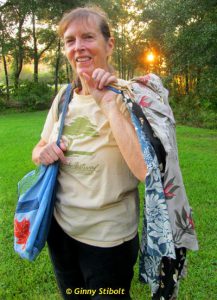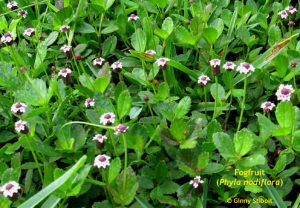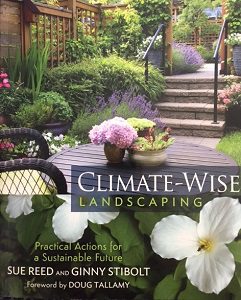
Ginny Stibolt is a botanist, educator, and life-long gardener who lives in Green Cove Springs, Florida. She is the author of several books on Florida gardening; her most recent, Climate-Wise Landscaping, was coauthored with Sue Reed and published by New Society Press in 2018. She has also written hundreds of articles about gardening and nature for various publications, and regularly makes speaking appearances to environmental and gardening groups around the U.S. More of Ginny’s blog entries can be found on her website, www.GreenGardeningMatters.com.
These days it feels like there are so many problems in Florida, from red tides and green algae slime to rising sea levels and stronger, more erratic storms, some of which may be related to climate change. To maintain our sanity, sometimes it seems like it would be a lot easier to just stop paying attention and lose ourselves in our gardens. Ahhh…
But there are many things we can do in our landscapes to make a real difference in the face of climate change, as Sue Reed and I present in our new book, Climate-Wise Landscaping: Practical Actions for a Sustainable Future. Sue is a landscape architect in Massachusetts and I’m a botanist and garden writer in North Florida, so our backgrounds are very different, but we were in total agreement that this book was necessary. Our goal was to present a wide variety of ideas to modify the way we think about and manage our own landscapes and those in our communities.
In our book, we don’t try to debate climate change. Instead, we take a more proactive, let’s-roll-up-our-sleeves-and-get-busy approach, providing hundreds of practical actions we can all take right now to address three objectives:
- To make landscapes more resilient in the face of climate change;
- To help birds, pollinators, and other wildlife better survive climate change; and
- To help mitigate climate change.
We also include primers on climate change, soil and water chemistry, native plants and other topics so readers can better understand the reasons for some of our suggested actions.
A lot of in-depth research went into writing this book, and we made some surprising discoveries. For example:
- Soil stores four times more carbon than all of the terrestrial plants, worldwide.
- When you save water, you not only help to preserve at-risk aquifers, but you are also saving energy, which reduces greenhouse gas emissions.
- Every pound of food that you grow (or obtain locally) offsets up to two pounds of greenhouse gases.
The easiest and most significant action people can take to become more climate-wise is to rethink their lawns. Typical lawn care usually consists of a combination of insecticides, fungicides, herbicides, synthetic fertilizers, over-irrigation, and reseeding in dormant seasons. This toxic mixture of poisons and fertilizers may keep the grass green year- round, but it harms the underlying soil in many ways, and synthetic fertilizers move quickly through the soil and contribute to the water pollution. Too many nutrients such as nitrogen and phosphorus are the main cause of noxious algae outbreaks.

While large-scale economic and political solutions are needed to address how to handle agriculture’s use of water and nutrients, smaller actions taken by millions of gardeners and landscape professionals can be equally significant. Just think of the positive impact to our waterways if millions of Florida households and thousands of Florida communities liberated their lawns from these treatments, right now. Let’s get busy. We can do this!
An untreated lawn will end up with many types of plants and a healthy soil ecosystem. Learn to love this diversity, which supports birds and pollinators and is safe for your family and pets 100% of the time.
We were extremely honored that Doug Tallamy, entomology professor at the University of Delaware and the nation’s leading native plant advocate, agreed to write a forward to the book. His words end with this thought:
“Read this book carefully. Everything you need to know to help heal our relationship with planet earth and empower you to make a much-needed difference is within these pages.”

Climate-Wise Landscaping and other books by Ginny Stibolt are available at the UF/IFAS Extension Bookstore (http://ifasbooks.ifas.ufl.edu/). She will be a guest speaker at the Florida Master Gardeners Central District conference in Deland on September 28, and the Northwest District Conference in Freeport on October 25. You can find out more about her books and tour dates at https://greengardeningmatters.blogspot.com/p/appearances.html.
 0
0
